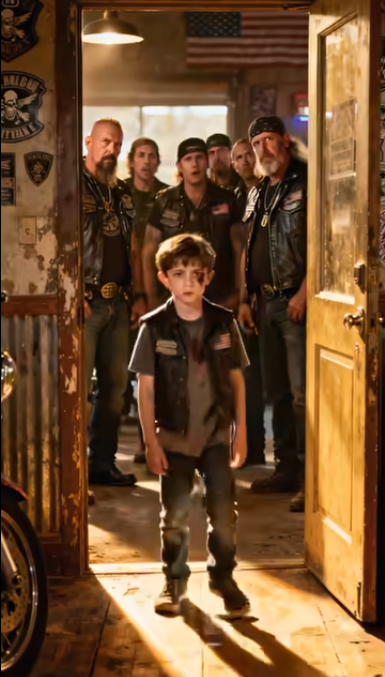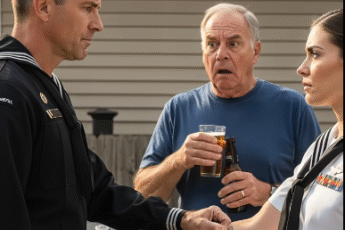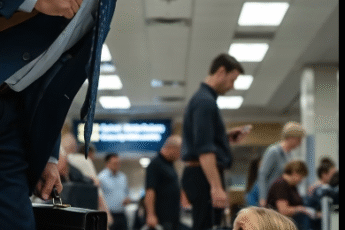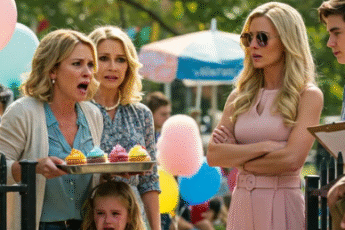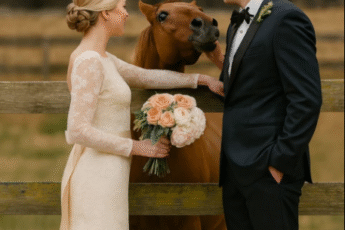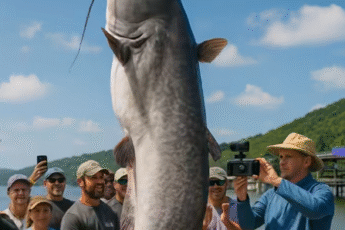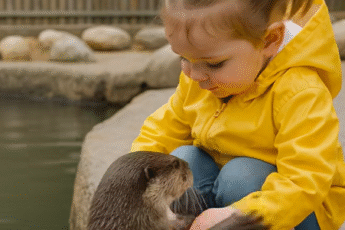The heavy door of the Hell’s Angels Clubhouse swung open on a Tuesday afternoon, letting in a shaft of golden sunlight and something nobody expected: a kid. Justin stood in the doorway, his backpack hanging off one shoulder, his sneakers scuffed and too small for his growing feet.
The conversations died mid-sentence. Pool cues froze in mid-stroke. Someone turned down the rock music blaring from the radio. A dozen bikers, men whose lives were etched into the lines on their faces, stared at the eleven-year-old who had just walked into their world uninvited.
Robert, the chapter president, set down his coffee mug. His eyes, sharp and intelligent despite the gray in his beard, locked onto the boy’s face. That’s when he saw it. The purple bruise blooming around Justin’s left eye, fresh enough that the edges still carried hints of red.
“You lost, kid?” Ben called from the corner, his tone more curious than aggressive.
Justin’s throat bobbed. His hands twisted the frayed straps of his backpack. For a second, Robert thought the boy might bolt, overwhelmed by the sheer presence of the men in the room. But then he straightened his small shoulders, lifted his chin, and said the words that would crack open something long-dormant in every man in that room.
“Can you be my dad for one day?”
The silence that followed carried a palpable weight. Every bad childhood, every absent father, every moment of feeling powerless that these men had survived, seemed to press into the room. Robert’s eyes found Tommy first, a product of the foster care system who’d aged out completely alone. Then Diego, whose father had vanished before he could even walk. Ben’s hand unconsciously touched the faint scars on his ribs, a permanent reminder of his old man’s belt.
“Career Day,” Justin continued, his voice steadier now. “It’s at school next Friday. Everyone’s bringing their parents to talk about their jobs.” He paused, swallowing hard. “I don’t have anyone to bring.”
Robert stood up slowly, his leather vest creaking with the movement. “What about your folks?”
“My real dad died in Afghanistan. Four years ago,” Justin’s voice didn’t waver, but his eyes went distant, lost in a memory Robert knew all too well. “And my mom’s boyfriend…” He stopped, his fingers unconsciously touching the tender skin around the bruise. “He’s not really the Career Day type.”
Diego moved closer, crouching down to Justin’s eye level, his movements gentle. “That shiner. How’d you get it?”
“Fell off my bike.”
“Try again,” Diego said, his voice soft but firm.
Justin’s carefully constructed facade crumbled. “Dale… that’s my mom’s boyfriend. He gets mad when she’s at work. She does double shifts at the hospital, so she’s gone a lot. Yesterday, I forgot to take out the trash.” His voice dropped to barely a whisper. “He said I was useless, just like my dead dad.”
The temperature in the room seemed to drop ten degrees. Ben’s jaw clenched so hard a muscle jumped in his cheek. Tommy’s knuckles went white around his beer bottle. Robert felt something ignite in his chest, a protective, ancient fury.
“And school?” Robert asked gently. “How’s that going?”
Justin let out a laugh, but there was no humor in it. “There’s this kid, Nicholas. He and his friends corner me every day. They call me ‘orphan boy.’ Push me into lockers. Steal my lunch.” He looked down at his worn-out shoes. “Last week, they threw my dad’s dog tags in the trash. I had to dig through garbage for an hour to find them.”
Robert remembered his own school days. The gnawing hunger, the shame of worn-out clothes, the way loneliness could feel like drowning on dry land. He’d sworn when he patched into this club that he’d never let another kid feel that powerless. Not if he could help it.
“Why us?” Tommy asked, his voice rough. “Why the Hell’s Angels?”
“Because you’re not afraid of anyone,” Justin’s eyes were bright now, urgent and pleading. “Nicholas’s dad is some big lawyer. Nobody stands up to them. But you guys,” he gestured around the room at the leather and chrome, at the men who looked like they were carved from granite and hard-won experience. “Everyone respects you. Everyone’s a little scared of you. I thought… maybe if you came, just for one day, they’d leave me alone. I’d have someone in my corner.”
That last sentence—I’d have someone in my corner—hit Robert like a physical punch.
The bikers looked at each other. No words were spoken, but entire conversations happened in those shared glances. They’d all been Justin once. Scared, alone, desperate for someone, anyone, to see them and stand with them.
Robert made his decision. “Friday, you said?”
Justin nodded, hope flickering across his face like the first light of sunrise.
“What time?”
“Nine-thirty. Room 204.”
Robert turned to his brothers. “Who’s got Friday morning free?”
Every single hand in the room went up.
“All right, then,” Robert looked back at Justin, and for the first time in what looked like years, the kid smiled—a real, genuine smile that reached his bruised eye. “We’ll be there. All of us.”
Justin’s eyes went wide. “Really? All of you?”
“Really. But Justin?” Robert’s voice went serious. “This thing with Dale. Does your mom know?”
The smile faded. “She’s so tired all the time. She’s working so hard to keep us afloat after Dad died. I don’t want to make things harder for her.”
“Protecting your mom by taking hits isn’t noble, kid. It’s just more pain.”
“I don’t know what else to do.”
Robert knelt down, putting them eye to eye. “You just did it. You walked in here and asked for help. That takes more guts than most men ever show.” He placed a heavy, reassuring hand on Justin’s shoulder. “We’re going to handle this. Career Day is just the beginning.”
As Justin left, his backpack seeming somehow lighter, the clubhouse erupted in quiet, purposeful conversation. They had four days to plan. Four days to make sure one scared kid learned what it felt like to have thirty-two fathers show up when it mattered.
Through the window, Robert watched Justin walk away and noticed something. The boy’s steps were different, stronger. They carried a weight they hadn’t before. Not burden, but purpose.
Friday morning arrived with gray clouds that threatened rain. Justin woke at 5:00 AM, too anxious to sleep. He’d replayed Robert’s promise a thousand times in his mind, terrified it had been just words. Adults made promises. Adults broke them. That’s what life had taught him.
He dressed carefully in his only button-up shirt, the one his mom had bought for his dad’s funeral. His fingers trembled as he fastened the buttons. In the kitchen, his mother kissed his forehead, noticing he’d barely touched his cereal.
“Big day, sweetheart.”
“Yeah, Career Day.”
She hesitated, a worried line between her brows. “Justin, I’m so sorry I couldn’t take off work. The hospital is just so short-staffed.”
“It’s okay, Mom. I figured something out.”
She studied his face, seeing something different there, something that looked almost like confidence. “You’re sure you’re all right?”
“I’m sure.”
At school, Nicholas was waiting by the lockers with his usual crew, Brett and Chase, both bigger than Justin, both cruel in that casual way privileged kids could afford to be.
“Look who showed up,” Nicholas sneered. “Ready for your big presentation, orphan boy? Oh, wait. You don’t have anyone coming, do you?”
Justin kept walking, head down.
“My dad’s bringing his Mercedes,” Nicholas laughed. “What’s yours bringing? A coffin?”
Brett shoved Justin hard into the lockers. His shoulder screamed in pain, but he didn’t react. He just kept walking toward Room 204, counting his steps, breathing through his nose the way his real dad had taught him when the world felt too big.
By 9:15, the classroom was filling with parents. Nicholas’s father arrived in a three-piece suit, shaking hands like he was running for office. Brett’s mom, a doctor, brought a stethoscope. Chase’s dad, a pilot, wore his uniform with crisp authority. Justin sat in the back row, watching the clock. The minutes crawled. Each tick of the clock tightened the knot in his chest. They aren’t coming. Of course, they aren’t. Why would they?
Then, just past 9:30, the rumble started.
It was distant at first, like thunder rolling in from miles away. But it grew and grew until the windows of the classroom rattled and all conversation stopped. Everyone—students, teachers, parents—rushed to look outside.
Thirty-two motorcycles rolled into the school parking lot in perfect formation. Chrome gleamed even under the gray sky. Engines roared in synchronized harmony. The Hell’s Angels had arrived.
Justin’s heart nearly exploded. They came. They actually came.
Robert led the procession, his bike the loudest, his presence commanding. They parked in a perfect V-formation, killed their engines simultaneously, and dismounted like a military unit. Every jacket bore the winged death’s head. Every face carried the weathered look of men who’d survived their own wars.
Mrs. Peterson, the teacher, stood frozen at her desk as the bikers filed into her classroom. They were too big for the space, too raw, too real. Nicholas’s father took an involuntary step back.
“Justin Miller,” Robert’s voice filled the room.
Justin stood, his legs shaking. “Here.”
“We’re here for you, kid.”
The classroom exploded in whispers. Nicholas’s smirk had vanished, replaced by a look of slack-jawed disbelief. His father looked like he’d swallowed glass.
Robert addressed the class with the calm authority of someone used to leading. “Morning, everyone. We’re the Hell’s Angels Motorcycle Club. Justin asked us to talk about what we do. So, let’s get into it.”
He started with the basics: how motorcycles work, the engineering behind them, the physics of balance and torque. Then Ben stepped forward and talked about their community programs: toy drives for children’s hospitals, fundraisers for veterans, escort services for survivors of abuse going to court.
“Most people see the patches and make assumptions,” Ben said, his gaze sweeping the room. “They think we’re just outlaws. But brotherhood means being there when it counts, especially when it’s hard.”
Then Miguel moved to the front. He was quieter than the others, his eyes carrying old wounds. “I grew up in a house where love looked like a fist,” he began, and the room went silent. “My father drank. He raged. He made me believe I was nothing. By thirteen, I was heading down the same path—fighting, stealing, hating everyone, including myself.”
Justin watched his classmates lean forward. Even Nicholas was listening, his usual arrogance gone.
“Then I met Robert,” Miguel continued. “He gave me a choice: keep destroying myself, or build something better. This club, this family, they taught me that real strength isn’t about violence. It’s about protecting people who can’t protect themselves. It’s about breaking cycles instead of continuing them.”
Mrs. Peterson was crying quietly at her desk.
Diego pulled out a photo. “This is Tommy at fifteen, living on the streets. This is Ben after three tours in Iraq with nobody waiting for him at home. This is Robert the day his daughter said she was proud of him.” He looked directly at Justin. “We’re not perfect. We’ve all got scars. But we choose every day to be better than what broke us.”
Robert turned to Justin. “You asked us to be your dad for one day. But here’s the thing, kid. Real family doesn’t work on schedules. You’re stuck with us now.”
The entire class erupted in applause. Brett was clapping. Chase looked stunned. Nicholas sat frozen, something complicated and unreadable working across his face.
After the presentation, as parents filed out, Nicholas’s father approached Robert with a forced smile. “Quite the performance.”
Robert met his eyes steadily. “Your boy gives Justin trouble. That stops today.”
The lawyer’s smile died. “Are you making a threat?”
“I’m making a promise,” Robert said. “There’s a difference.”
Outside, as the bikers prepared to leave, Justin couldn’t find words big enough for what he felt. Robert just squeezed his shoulder. “See you tomorrow, kid. We’re teaching you how to change oil.”
As thirty-two engines roared back to life, Justin stood in the parking lot and watched his family ride away. Something shifted in his chest, a door opening that he didn’t even know had been locked.
The weekend passed in a blur of normalcy that felt almost surreal. Justin spent Saturday at the clubhouse learning basic motorcycle maintenance, his hands black with grease, his smile impossible to wipe away. For two days, the weight he’d carried since his father died felt lighter.
But Monday brought reality crashing back. Dale had seen the video. Some parent had posted it to Facebook—”Local Bikers Steal the Show at Career Day”—and it had spread through the community like wildfire. By the time Dale stumbled home Monday evening, three beers deep and smoldering with humiliation, he’d watched it seventeen times.
Justin heard the truck before he saw it, that particular engine growl that always made his stomach clench. He was at the kitchen table doing homework when Dale kicked the door open.
“You think you’re special now?” Dale’s words slurred at the edges. “Got your little biker friends?”
Justin’s mother wouldn’t be home for another two hours. He calculated escape routes. Front door blocked. Back door through the kitchen. My phone is upstairs.
“I asked you a question!” Dale moved closer, and Justin could smell the beer, the rage, the familiar scent of violence about to break loose.
“I just needed someone for Career Day.”
“You made me look like garbage! Everyone at the bar was talking about it! ‘Poor Justin, no father figure.’” Dale’s hand shot out and grabbed Justin’s shirt, lifting him slightly. “You got a father figure right here!”
“You’re not my father!” The words escaped before Justin could stop them.
Dale’s face went purple. His fist drew back. Justin closed his eyes, his body tensing for the impact.
The blow never landed.
The front door opened. Not kicked, not forced, just opened with a key that hadn’t existed an hour ago. Robert walked in first, followed by Ben and Diego. Three more bikers flanked the entrance. They moved with unhurried purpose, filling the small house with their presence.
Dale’s fist remained frozen midair. “What the—? Get out of my house!”
“Not your house,” Robert said calmly, pulling out his phone. “The lease is in Jennifer Miller’s name. You’re just living here.” He tapped the screen. “Jennifer gave us a key this afternoon. She’s known for a while something was wrong, just didn’t know how to handle it.”
Dale dropped Justin and lunged toward Robert. Ben stepped between them with the easy confidence of someone who’d handled much worse. “Don’t,” Ben said quietly. “You don’t want to do that.”
Robert moved past them to Justin, checking him over. “You good?”
Justin nodded, his throat too tight for words.
Diego placed a manila folder on the kitchen table. It landed with a soft thump that sounded like thunder. “Open it,” he told Dale.
Dale’s bravado flickered. His hands shook as he picked up the folder. Inside were photographs of Justin with bruises over the past six months, timestamped. Medical records from the school nurse documenting suspicious injuries. A written statement from Mrs. Peterson detailing behavioral changes. Text messages Dale had sent to Jennifer, threatening and cruel.
“Where did you—?”
“Justin’s school nurse has been documenting for months,” Robert explained. “She was building a case. Jennifer’s co-workers at the hospital have noticed her injuries, too—the ones you blamed on her being clumsy. We talked to a lot of people this weekend. Turns out you’ve left quite the trail.”
Dale’s face had gone from purple to white.
Ben pulled out another document. “Protective order, ready to file. We’ve got three witnesses who will testify. Jennifer’s lawyer—a real one—is prepared to pursue full custody protection.”
Robert leaned against the counter. “Here’s how this works. You have two choices. Choice one: you pack your things, you leave tonight, and you never contact Jennifer or Justin again. You disappear. We’ll hold on to these files, but we won’t file them. Choice two: we file everything tonight. Police get involved. Child Protective Services gets involved. You’ll be arrested by morning, and everyone in this town will know exactly who you are.” He paused. “Your call.”
Dale deflated, his bravado collapsing under the weight of consequence. “I need an hour to pack.”
“You’ve got thirty minutes,” Diego said, checking his watch. “We’ll wait.”
Less than half an hour later, Dale’s truck pulled out of the driveway. As the taillights disappeared, Robert called Jennifer. “It’s done. He’s gone. Justin’s safe.”
When Jennifer arrived home forty minutes later, she found her son at the kitchen table, surrounded by six bikers eating pizza. Her eyes went to Justin first, checking for new injuries, seeing none. Then to Robert. “Is he really gone?”
“He won’t be back. We made that very clear.”
She collapsed into a chair as tears of pure, overwhelming relief came, flooding through her like a dam breaking.
Ben quietly slid a box of tissues across the table.
“Why?” she whispered. “Why would you do this for us?”
Robert looked at Justin, then back at her. “Because someone needed to. And because that kid was brave enough to ask.”
That night, after the bikers left, Justin lay in bed, staring at the ceiling. The house felt different, lighter. The air moved through rooms that had been suffocating for years. His phone buzzed. A text from Robert: Sleep tight, kid. We’re around if you need us.
For the first time in years, Justin slept through to the morning, a deep, dreamless sleep.
In the weeks that followed, the clubhouse became Justin’s second home. His grades improved. The bruises faded. His mother smiled more. But Robert noticed something else. Nicholas had stopped bullying Justin completely, but the kid looked worse—quieter, withdrawn, with dark circles under his eyes that Robert recognized all too well.
“Ben,” Robert said one Thursday afternoon. “That Nicholas kid. Something’s off. I want to know why.”
Ben made some calls. By Friday, they had answers. Nicholas’s mother had passed away years earlier. His father, Tom Bradford, the polished lawyer, had been drowning in grief ever since, with drinking becoming the only way he could function. Nicholas was raising himself.
“So, Nicholas becomes the bully because he’s getting bullied at home, not with fists, but with absence,” Robert mused. “Then we fix it.”
“The kid tortured Justin for months,” Tommy pointed out.
“And Justin had Dale,” Robert countered. “Nicholas has a ghost wearing his father’s face. We break cycles. That’s what we do.”
The next morning, Robert and Ben showed up at Tom Bradford’s office unannounced. “Your son is drowning,” Robert said simply. “And you’re too busy to notice.”
Tom’s professional facade crumbled under their direct, non-judgmental questioning. “I don’t know how to be a father without her,” he finally admitted, his voice breaking.
“My daughter was seven when her mother left,” Robert shared. “I was drowning in bottles just like you. One night, I came home and found her making dinner—a seven-year-old trying to feed herself because I was too wasted. That was my rock bottom. It’s not too late for you.”
Ben slid a business card across the desk. “Veterans Support Group. Meets Tuesdays and Thursdays. Half of us go. These guys get it. Your son needs his father back.”
Days later, Tom attended his first meeting. Robert sat beside him for the entire two hours. Nicholas was harder to reach, but when Diego told him Justin was part of their youth mentorship program, it stopped him cold.
The confrontation happened at the clubhouse. Justin was sanding wood when Nicholas walked in. The room went quiet.
“I’m sorry,” Nicholas’s voice cracked. “For everything. The things I said about your dad, the locker stuff, the dog tags. I was angry at my own life and took it out on you.”
Justin studied him for a long moment. He’d learned something from Robert: carrying hate was heavier than letting it go. “Your mom passed away, right?”
Nicholas nodded.
“That sucks. My dad, too.” Justin set down the sandpaper. “You want to help me finish this bookshelf? I’m terrible at corners.”
Nicholas’s eyes widened. “Seriously?”
“Robert says we’re better at building things than breaking them,” Justin said with a small smile. “Might as well start now.”
The years unfolded, one day at a time. Justin grew taller, his confidence solidifying. Nicholas became his unlikely best friend, both of them fixtures at the clubhouse. Tom Bradford got help and started coaching Little League. Jennifer Miller finished her nursing degree.
Graduation day arrived with perfect sunshine. Justin stood at the podium in his cap and gown. In the third row sat his mother, beaming. Against the back wall stood thirty-two bikers in their leather vests.
“Everyone talks about family like it’s just biology,” Justin began. “But I learned something different. Family is the people who show up when your world falls apart.” His eyes found Robert. “Family is a group of bikers who answered a desperate kid’s question and stayed long after they had to. They taught me that strength isn’t about intimidation; it’s about protection. That real men build others up instead of tearing them down.”
Nicholas, sitting with his father, wiped his eyes. Tom Bradford, five years sober, squeezed his son’s shoulder.
“So to everyone here,” Justin concluded, “find your people. Be someone’s people. Show up. Stay. That’s what matters.”
After the ceremony, Robert handed Justin a folded leather vest. The patch on the back read: HONORARY BROTHER, FOREVER FAMILY. “You earned this,” Robert said.
Justin pulled it on, and the bikers erupted in cheers. His mother hugged him tight. “Your father would be so proud.”
“Which one?” Justin asked, grinning through his tears.
She laughed. “All of them.”
He had found family where he least expected it, and in doing so, had helped heal not just himself, but an entire community of men who knew all too well what it felt like to need someone in their corner.
